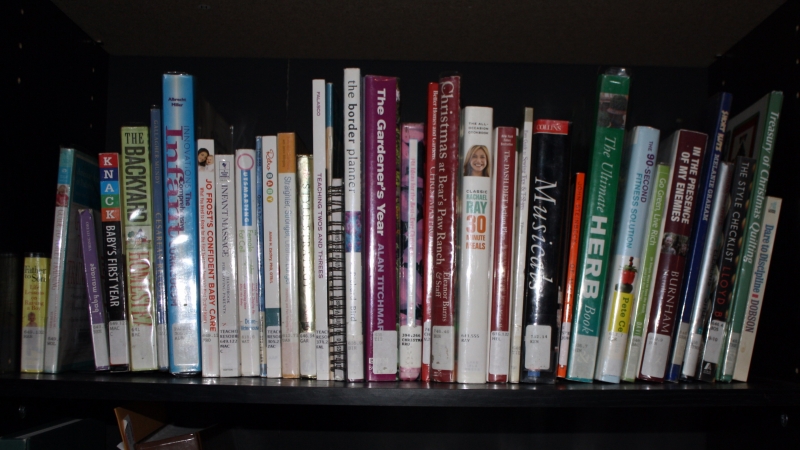This March has felt like what Almanzo describes springtime to be like in Farmer Boy: busy from dawn until dusk with no time to sit except to race down some food. I had 10 cubic yards of compost delivered earlier this month and it’s been busy shoveling and building and planting. An herb bed built and filled with compost (thanks to my mother-in-law for the help!), extra compost added to one of my raised beds, eleven trees planted. Raking the old dead grass off the “pasture” (actually the septic field).
When I have had opportunity to sit down, I have done some reading – but it’s almost entirely been children’s picture books read to Tirzah Mae and Louis. So I’ve got another spare list this month (lots of in-progress books, only two finished).
Books for Loving:
- Church History in Plain Language by Bruce L. Shelley (In Progress)
I’ve gotten a few more chapters read in my church history studies – and am SO thankful that I scheduled myself a “catch up” month every fourth month. I’m going to need it (especially since every section gets longer!) I’m currently looking at the period between Constantine and the Middle Ages, a time ripe with creeds and controversies. - Getting to Know the Church Fathers by Bryan Litfin (In Progress)
I’m clearly abusing my church library’s lack of fines for not returning books on time – I’ve checked this one out several times, and currently have it out over a month longer than the three week lending period. But as far as readable mini-biographies of the church fathers go, this is excellent. I’ve resolved to read the last three chapters this week so I can return it next Sunday. (End the abuse!)
Books for Growing:
- Your Time-Starved Marriage by Les and Leslie Parrott (In Progress)
The Doctors Parrott make good on their promise of short, readable chapters. I can read a chapter in just 7 minutes (while doing something else, because I rarely simply read these days.) In some ways I think I started reading this just a moment too late, since Daniel and I had already come up with some action steps to deal with the “now that we have two kids, neither of whom sleep predictably, it feels like we never spend any time together-together” problem. But what they’ve said already has resonated with me – and I’m about to get into the nitty-gritty part, so I’m hopeful they’ll have some useful tips for making intentional time together. - Success as a Foster Parent by the National Foster Parent Association with Rachel Greene Baldino (In Progress)
Reading this has slowed to a crawl thanks to all the reading and homework we have for our foster care class – but I’m glad for the start I had on this before our class, which has meant that our classwork is more familiar. This is a great introduction to the process for someone who’s interested in fostering but who wants to learn a little about it before they start juggling schedules to actually get certified. - Growing Family Fruit and Nut Trees by Marian Van Atta with Shirley Wagner (In Progress)
We planted five apple trees this month and are hoping to have a plan for the rest of the orchard by fall so we can put everything else in first thing next spring. So I’m reading up on fruit trees. This particular book is somewhat dated but ended up being my first pick to read right through because it doesn’t attempt to be comprehensive, which means that it’s quite easy to read. I read the first hundred pages in moments snatched here and there the day we planted our apple trees (read: when going to the bathroom or taking a break to breastfeed Louis). The remaining 20 pages are waiting for…someday soon, probably. One of the most interesting features of this book is that the author writes from Florida, so she discusses plenty of trees I’d never thought of planting. I spent my early teen years reading homestead memoirs from back-to-the-land folks in Maine and envied their ability to grow their own maple syrup. Now I’ve had a chance to envy Ms. Van Atta’s ability to grown her own oranges and grapefruits!
Books for Knowing:
- The Almost Nearly Perfect People by Michael Booth (In Progress)
You’ve heard of how the Scandinavian countries are some sort of utopia, right? (Unless you read conservatives, then you might be pretty skeptical of that claim.) Anyhow, Booth writes about Scandinavia (where he’s lived for some time, having married a Dane) in this semi-journalistic, semi-memoirish book. In general, I’m enjoying reading this, although Booth jumps here and there and everywhere without any obvious thesis or point even to the individual chapters, much less to the entire book. - The Place Where Hell Bubbled Up: A history of the First National Park by David A. Clary
A short (64 page) little book filled with old-timey black and white photos from the first days of Yellowstone National Park along with the tale of its discovery and early status as a national park (approximately until the introduction of automobiles.) I enjoyed reading this in preparation for our family trip to Yellowstone this summer.
Books for Enjoying:
- The Book of Three by Lloyd Alexander
Daniel and I have been trying to complete the “Light Reader” level for the 2017 Christian Reading Challenge put out by Tim Challies. One of the book categories is “a book for children or teens” and I’ve been intending to read the Chronicles of Prydain since Amy’s husband Mike recommended it when I asked for advice finding a completed series that would be similar to Brandon Sanderson’s work (Daniel is a fan of Sanderson, but neither Daniel and I are super fond of reading series that haven’t been completed – and Sanderson has LOTS of those.) Anyway, we read this first book in the series and I certainly enjoyed it enough to continue on with the series. It’s a relatively lighthearted children’s fantasy with plenty of adventure and not-too-heavy-handed-learning-opportunities.
Don’t forget to drop by 5 Minutes 4 Books to see what others are reading this month!


